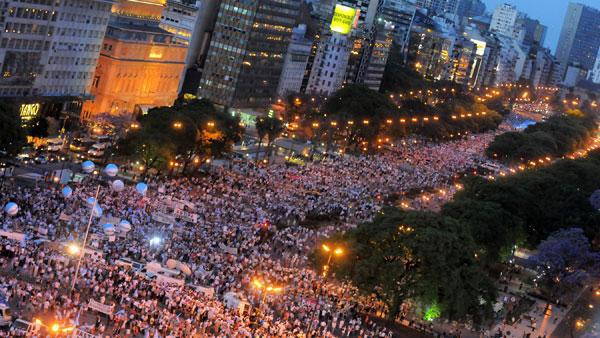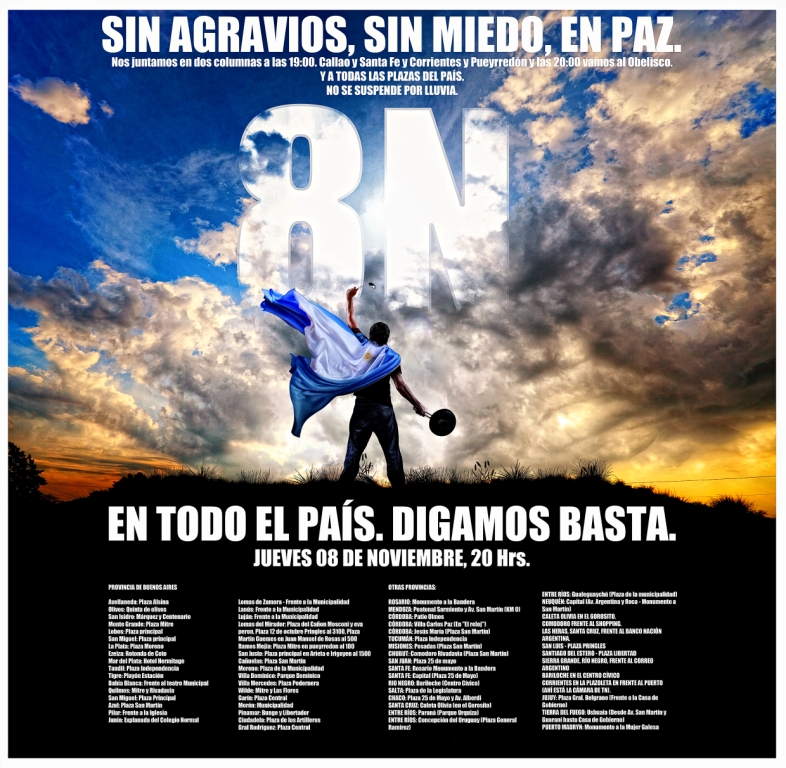On November 8, 2012, a new national protest took place in Argentina, this time under the slogan #8N [1] [es] which makes reference to the date of the mobilization. The call was spread massively through several social networks, and during the day many opinions, reports, photos and videos were published on Twitter. The ones favoring the protest were found under the hashtag #8NYoVoyPorQue [2] [es](#8N I go because) and the ones against under #8NYoNoVoyPorQue [3] [es](#8N I don't go because).
In a previous post we commented [4]the reasons why Argentinians are protesting. The web page Argentinos Indignados [5] [es] answers the question “Why should we take the streets?”. Some of the reasons this page gives are:
- Te dicen en qué divisa tenés que ahorrar; pero convirtieron a la nuestra en apenas papelitos de colores que no son reconocidos en el mundo y que se devalúan diariamente.
- Liberan asesinos y otros criminales para que asistan a sus actos políticos.
- La pobreza sigue igual, las villas crecen y se gastan millones en propaganda política como “fútbol para todos”.
- La libertad de expresión se va convirtiendo de a poco en un recuerdo.
- Los amigos del poder van monopolizando la información.
- La Presidente abusa de la Cadena Nacional, cual Estado totalitario
- Sus aliados de otros países son lo peor que tiene la comunidad internacional. Argentina esta cada día más excluída del mundo.
- La calle es de los delincuentes, y los terroristas son amigos privilegiados del gobierno.
- Quien piensa distinto es un enemigo.
- Sus seguidores tienen un grado de fanatismo capaz de justificar todo, hasta el adoctrinamiento infantil y la corrupción.
- El nivel de corrupción de sus funcionarios es el más alto que se tenga memoria.
- They tell you which currency you should use for your savings; but they are turning ours into little color papers that are not recognized in the world and that lose value daily.
- They free assassins and other criminals so they can be present in their political rallies.
- Poverty remains the same, slums are growing and millions are spent in political propaganda such as “football for everyone”.
- Freedom of expression is slowly becoming a memory.
- The friends of those in power are monopolizing the information.
- The President abuses the National Broadcast, like a totalitarian state.
- Her allies from other countries are the worst that the international community has. Argentina is becoming more excluded from the world.
- The streets belong to the criminals, and terrorists are privileged friends of the government.
- Anyone who thinks differently is an enemy.
- Their followers are such fanatics that they are capable of justifying everything, even child indoctrination and corruption.
- The level of corruption among their bureaucrats is the highest that anyone can remember.

Image of the protest that took place in several cities across the country. The picture is from 9 de Julio Avenue in Buenos Aires – from Facebook page Yo no voté a la Kretina y Ud? (I didn't vote for the Kretin and you?)
The blog Digo Pavadas [6] [es] made an analysis before the protest:
¿De que puede servir mas que para sentar un nuevo precedente de que este gobierno es sordo a lo que no le conviene escuchar? Saldrá en los diarios del mundo, dirán que el gobierno no responde, generará mas desconfianza internacional, etc. Para la hora en que se ha citado el acontecimiento, todos los diputados, senadores y ministros, estarán plácidamente mirando por televisión a la muchedumbre enardecida que “se da el gusto” de protestar (dirán).
What's the point of protesting other than adding a new precedent that this government is deaf to the issues that is not in its interest to listen to? [The protest] will appear in newspapers around the world and they'll say this government doesn't answer, and it will generate more mistrust internationally, etc. By the time the protest takes place, all the congressmen, senators and ministers will be comfortably watching on television how the outraged mass “takes pleasure” in protesting (they'll say).
The blog then explained who the protest should be directed at:
Nuestro país es muy presidencialista, por eso todos creen que la culpa de como nos va es de quien sea el presidente, pero en realidad, la culpa es de los cómplices representantes del pueblo que se dejan manipular por el poder ejecutivo. Por eso insisto, es a ellos a los que hay que reclamar que hagan su trabajo y que escuchen a las personas que los votaron.
Our country is presidentialist, that is why everybody thinks that whoever is the president is to blame for the situation, but in reality, the blame belongs to the accomplice representatives of the people who let themselves be manipulated by the executive power. That is why I insist, we must demand that they [the representatives] do their job and listen to the people who voted for them.
Under the hashtag #8NYoVoyPorQue [2] [es] Argentinians shared on Twitter the reasons to protest. Daniel Ferrero (@Turis2364 [7]) [es], for example, tweeted:
@Turis2364 [8]: #8NYoVoyPorque [9] se respete a la justicia “#8N [1]
@Turis2364 [8]: #8NYoVoyPorque [9] justice must be respected #8N [1]
Martín Rodriguez (@jabberwocky_MR [10]) [es] said he was attending because he loves Argentina and he's tired of politicians. Also, Jose Marchmar (@josemachmar96 [11]) [es] wrote that he wants a country with freedom of expression and respect for the Constitution.

Image inviting citizens to protest, from the webpage http://argentinosindignados.com
On the other hand, Argentinians also gave reasons not to participate in the protests under the hashtag #8NYoNoVoyPorQue [3][es]. Cristian Hendriksen (@CrisHendriks [12]) [es] shared his opinion:
@CrisHendriks [13]: #8NYoNoVoyPorque [14] se están produciendo cambios históricos sobre igualdad e inclusión en mi país y quiero que se profundicen! #VivaArgentina [15]
@CrisHendriks [13]: #8NYoNoVoyPorque [14] there are historic changes taking place towards equality and inclusion in my country and I want them to run deeper! #VivaArgentina [15]
Together with other Twitter users who used this hashtag, Ivana (@ivistub [16]) [es] said she wouldn't take part because “to change the country we need to vote, not complain”.
According to the news agency Telam [17] [es], several opposing politicians participated in the protest and its call:
A diferencia de la marcha concretada el 13 de Septiembre, donde los organizadores se presentaban como independientes de cualquier agrupación política, la realidad señala que ahora los caceroleros ya no podrán despegarse del intento opositor que busca capitalizar esa movilización.
A difference between this one and the protest on September 13, when the organizers presented themselves as independent of any political affiliation, is that now reality shows us that protesters cannot longer keep themselves away from the opposition's attempts to capitalize from the movement.
The Facebook page “I didn't vote for the Kretin and you?” [18][es], one of the organizers of the protest, posted a warning:
Gente, importante:
Estoy leyendo en algunos grupos que quieren pedir que la Presidente renuncie en el acto……
NO SE ENGANCHEN
No pedimos la renuncia de nadie!
Pedimos que hagan las cosas bien!!!!!!!
Por favor, no demos letra a idiotas que nunca faltan!
People, important:
I am reading that some groups want to ask for the president to resign during the protest…
DON'T GET COUGHT UP
We are not asking for anyone's resignation!
We want things to be done right!!!
Please, don't give space to the idiots that never fail to appear!
Citizens gathered across the country in several cities including Mendoza, Córdoba, Santa Fe, Rosario, Salta, and Tucumán. The biggest group was in Buenos Aires, along the Obelisco as well as in various neighborhoods and cities of the province.
Also, Argentinians living overseas expressed their opinion, as Infobae [19] [es] informed. The site also published images sent by the protesters:
Los cacerolazos se iniciaron en Sidney y se extendieron por Viena, Ginebra, Berlín,Roma, Milán, París, Barcelona, Madrid y Londres. El común denominador de quienes fueron y de quienes se expresaron en Twitter es el rechazo a ciertas políticas del Gobierno.
The cacerolazos (pot-banging protests) started in Sidney and extended to Viena, Ginebra, Berlin, Rome, Milan, Barcelona and Londres. The common denominator between those who attended and those who expressed themselves on Twitter was their rejection of certain government policies.